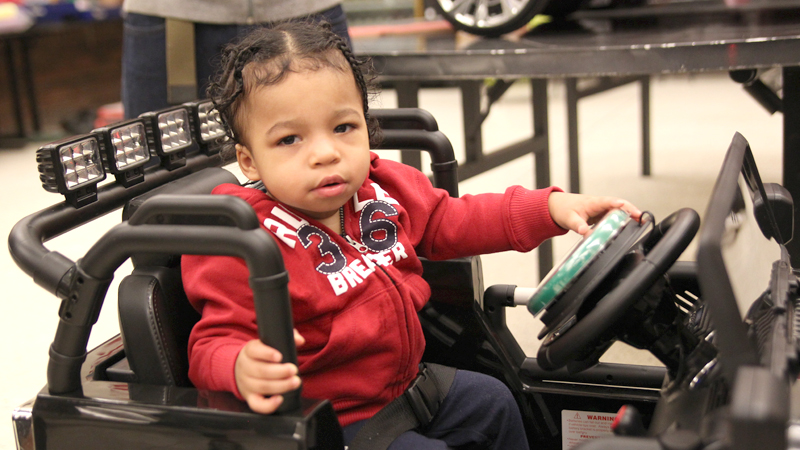Special-needs kids get modified cars

By BOB JACKSON
news@vindy.com
CANFIELD
Kaige Hall-Ward gripped
the steering wheel of his gleaming, black SUV, looked at the wide-open road in front of him, and let out an absolutely delighted squeal.
Kaige is a 1-year-old who has had problems with mobility due to autism, but that changed Saturday. Now, he’s ready to roll.
Kaige was one of 18 children who got a new set of wheels Saturday during Go Baby Go Youngstown, held at the Mahoning County Career and Technical Center on Palmyra Road.
A 19th car was built and taken to a child who could not attend because he is homebound.
Go Baby Go is a program that provides modified, ride-on cars for young children with disabilities. Specifically, it’s aimed at children up to age 5 who have difficulty moving on their own due to medical issues such as cerebral palsy, Down syndrome, or spina bifida. Each car is tailored to meet the child’s specific needs.
The child can operate the car by using modified controls, and there is also a remote control with each car so the child’s parents can take the wheel when necessary, said Dan Lankitus, one of the program volunteers.
“These kids can kind of navigate through their world with the help of these cars,” said Shannon Mulichak, a therapist with the Mahoning County Early Intervention program who works with Kaige. She’s the one who recommended to Kaige’s parents, William Ward and Kareena Hall, that they get Kaige into the Go Baby Go program.
Ward, 24, said the entire experience was an eye-opener.
“I thought the cars were already going to be built, and we were just going to come pick them up,” he said. “But watching them actually being built, that was really cool.”
Some career center engineering students worked alongside professional electricians to adapt the cars for the children. Students in the school’s science, technology, engineering and math program made decals for the cars, said Bev Lankitus, who coordinated the event.
“My kids love stuff like this,” said Walt Baber, an engineering instructor at MCCTC. “It’s one of the most emotionally rewarding things we do all year, without a doubt.”
For Linna and Eddie Nieves, it has been a daunting challenge raising twin boys born with spina bifida. Now, they’ll have to make room in the house for the motorized cars each of their sons, Micah and Cairo, took home Saturday.
“It was devastating,” Linna said of hearing the boys’ diagnosis for the first time. “It was a bit much to realize that both boys would have such difficulty. But from the beginning, I have been optimistic. I figure God gave them to us for a reason.”
The family’s load got even heavier when Linna was diagnosed with breast cancer just six months after the twins were born. She credits her husband and their oldest son, Eddie III, with helping to shoulder the load.
“Now we’re definitely going to get these boys some driving lessons because [Cairo] will be running over everyone,” she said, laughing.
A makeshift track was set up in the event room where the children could learn how to drive their new cars.
Bev Lankitus said the cars in their original form cost about $150 to $200 each, but combined with modifications that include electric switches, seating support and padding, the cost increases to about $400. The Magic of Michael Foundation sponsored the event.
Magic of Michael was founded three years ago in honor of Michael Hirschbeck, a son of Mahoning Valley residents John and Denise Hirschbeck, who died in 2014 of complications from Adrenoleukodystrophy, or ALD, a genetic brain disease that also killed Michael’s older brother, John.
“We just wanted to do something to carry on Michael’s name,” said Michael’s sister, Erin Hirschbeck, foundation president. “We help people who are having a lot of curve balls in their lives.”
John Hirschbeck was a longtime Major League Baseball umpire, who retired in 2016.
The event also had a toy room where volunteers from RePlay for Kids made modified toys for the children to take home with them, said Natalie Wardega of RePlay.
Besides simply having fun, Wardega said learning to use the switch-activated modified toys helps teach children about “the cause-and-effect relationship” aspect of science.
 43
43
